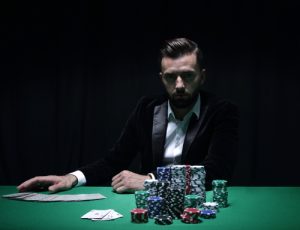The most important “secret” behind successful trading and investing is remarkably straightforward.
And yet… there are legions of investment managers and analysts on Wall Street who manage billions of dollars and know nothing about it.
Click here to watch Nicholas Vardy’s latest video update.
And it’s not their fault…
I know, because I was once one of them.
I spent thousands of hours studying economics and investing.
And I never came across this single most important secret to successful trading in any traditional investment textbook.
Yet, as any poker player will tell you, this secret is the key to the long-term success of every trader.
The Market Wizards Secret
Jack Schwager’s classic book, Market Wizards: Interviews with Top Traders, was published just over 30 years ago.
The book consists of interviews with some of the top traders of the day.
Many of these traders went on to run some of the world’s most successful hedge funds.
They created generational wealth for themselves and their investors.
When Schwager asked these market wizards what the most important thing behind their success in trading was…
They all said the same thing: “bet size.”
As market wizard Larry Hite put it…
Never risk more than 1% of your total equity in any one trade. By risking 1%, I am indifferent to any individual trade. Keeping your risk small and constant is absolutely critical.
“Turtle trader” Richard Dennis observed the same thing:
You have to minimize your losses and try to preserve capital for those very few instances where you can make a lot in a very short period of time. What you can’t afford to do is throw away your capital on suboptimal trades.
Many of these traders had to learn the hard way.
The original market wizards – including Forbes 400 members Bruce Kovner and Paul Tudor Jones II – recall that they lost the most money when they bought positions that were too big relative to their capital.
Yet it was these big losses that hammered home the importance of bet size.
Understanding bet size also explains why Kovner and Tudor Jones have lasted more than 20 years in the hedge fund business… and continue to run two of the most successful hedge funds in the world.
What Poker Players Can Teach You About Investing
In my study of successful traders, I’ve been struck by the number of traders who are also good poker players.
David Einhorn, the founder of hedge fund Greenlight Capital, even once finished third in the World Series of Poker.
Here’s why…
Those from traditional investment backgrounds focus on understanding the underlying investment – whether that’s a stock, bond, currency or commodity.
Poker players are far more aware of the risks each trade entails – and, by extension, the importance of bet size.
Poker players instinctively see the parallels between trading and poker.
They view trading as a “game” rather than an intellectual exercise in financial analysis.
Poker players see each trade as a “bet” they place and a matter of “playing the odds.”
If they are dealt a bad hand, they throw their cards in. If they are dealt a good hand, they increase their bet size.
Put another way, poker players focus on playing the hands they are dealt.
As a result, they don’t attach their egos to each bet they place.
The Dangers of Being “Right”
Traders like to be right.
It affirms our intelligence and boosts both our egos and our brokerage accounts.
But many dangers lurk in this approach.
Consider the following case…
Say you’ve found the investment opportunity of the century. It’s a sure thing.
You have $50,000 to invest. It’s such a good idea that you decide to bet the farm. Your bet size is 100%.
Two things can happen… No. 1: Your bet works out, and you triple your money. You realize that you are a trading genius.
Or No. 2: Something unexpected happens… and you lose all your money.
Here’s a quick quiz… Which outcome is worse?
You’re probably thinking, “That’s a dumb question! Losing your money is worse!”
Here’s why you’re wrong…
If you lose the first time around, you lose only $50,000.
But if you win, here’s what could happen…
You think you’re a trading genius. You borrow money to invest (invest on margin). Your friends give you money to manage. And you bet all the money on the next sure thing.
Then that investment goes belly-up.
In the end, you lose $150,000 (after all, you tripled your money the first time!)… all your borrowed money… and your friends’ money as well.
This scenario plays out more often than you realize.
How to Stay in the Game and Become a Successful Trader
Let me leave you with some rules of thumb for successful trading.
- Always calculate the maximum you are willing to lose on a trade – and size your position accordingly.
- Set your stop price based on the specific characteristics of the stock.
- Never risk losing more than 1% of your capital on any one trade.
I personally have never risked more than 0.5% (one-half of 1%) on any one idea for any of the hedge funds I traded.
So what is the poker player’s most important “secret” to successful trading?
Successful trading is less about being right all the time… and far more about sizing your bets to make sure that you stay in the game long enough to win.
Good investing,
Nicholas

